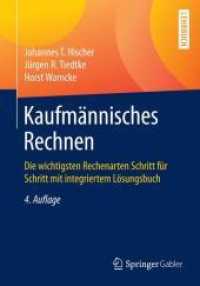Full Description
Policy makers tend to deal with future risks by increasing the standardisation of national educational systems, a process supported by global educational policy ideas, quality assurance mechanisms and governing instruments and practices. This book presents the reader with tools to challenge accepted ideas about the standardising forces transforming educational reality, by discussing standards and standardisation from a range of different theoretical perspectives and contexts and posing questions such as: Why do we think about education through the lenses of standards? What are the assumed conditions underpinning the idea of standards?
Organised into three sections, the historical, theoretical, and philosophical discussions in the first and third sections of the book underscore how educational standards as a phenomenon can be understood in a variety of ways, giving readers insight in to the ambiguous and situated aspects of the phenomenon. Six case studies in the middle section provide an international approach to the study of standards, illuminating how standards simultaneously represent a global and a context specific phenomenon.
Across the diversity of theoretical and empirical writings, the book not only provide readers with insight but also broadens the scope of future empirical analyses of the historical, political, and social embeddedness of standards in education.
Contents
Part 1. Framing
Chapter 1. Introduction: How to Frame Standards and Standardisation in Education; Hanne Riese, Gunn Elisabeth Søreide, and Line T. Hilt
Chapter 2. Waves of Standardisation; Paolo Landri
Chapter 3. Ambiguities of Standardisation in Education; Palle Rasmussen
Part 2. Findings
Chapter 4. Global Agenda on Knowledge and Governance and Language Literacy Practices in Secondary Education in Greece; Anna Tsatsaroni and Sofia Koutsiouri
Chapter 5. Terms of Talent in an Upper Secondary Danish School Context: Local Reactions to Standardisation of Educational Talent; Anette Rasmussen
Chapter 6. Narrative Control and Standards for Pupil Identity in The Norwegian LK-20 Educational Reform; Gunn Elisabeth Søreide
Chapter 7. Understanding the Effects of the Standardisation of Social Competences in the Italian Educational System: Teachers' Conceptions in a Context of Normative Indeterminacy; Alice Spada
Chapter 8. Mastering Life through Skills: Risk Prevention through 'Standards of the Self' in Health and Life-Skills Education; Line T. Hilt and Hanne Riese
Chapter 9. Performance Standards in Assessment and Possible Alternatives; Astrid Tolo
Part 3. Futures
Chapter 10. Reimagining Educational Standards; Aline Nardo
Chapter 11. How not to be Governed by Social and Emotional Standards; Line T. Hilt
Chapter 12. Redesigning Standardised Education in the Totally Pedagogised Society; Parlo Singh and Stephen Heimans





